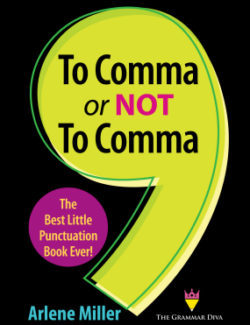Arlene Miller's Blog, page 38
October 5, 2018
Best of the Grammar Diva – Apostrophes: When to Use Them—And When Not To
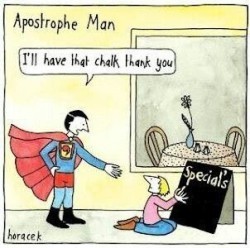 Some apostrophes are not OK!
Some apostrophes are not OK!Originally posted on August 9, 2013
Apostrophes—those things that look like single quotes, or maybe commas hanging in the air—have a couple of uses in the English language. First, they are used for contractions. Second, they are used to indicate possession. We are going to talk all about possessives in next week’s blog post (can you wait?). That leaves us with contractions.
Contractions are word combinations with letters left out to save space, I guess. Or perhaps to make it easy to say in conversation. They slide off the tongue much more easily than two separate words. The apostrophe is put in place of the missing letter (or letters). The common words to be shortened in a contraction are not, have, and are (am, is)
Some contractions with not: didn’t, isn’t, aren’t, haven’t, wouldn’t, won’t, can’t.
Some contractions with have: could’ve, would’ve, I’ve, you’ve, we’ve
Some contractions with the to be verb (are, am, is): I’m, you’re, we’re, he’s, it’s, they’re
Well, you know I’m not writing this blog post to talk about contractions. You know all about them. Almost. So here is all I am going to say about contractions, before I move on to when NOT to use apostrophes:
1. In formal writing (as opposed to conversation or a friendly e-mail), I would suggest avoiding some contractions. The contractions with n’t for not are fine, but I would spell out words such as could have, would have, should have, I have, you have, we are, most of the time. In particular I would not use contractions where the shortened word is have. Is it wrong? No. But it does sound more conversational and less professional.
2. Oh, please, remember that the contraction meaning it is is the one with the apostrophe (it’s).
3. Oh, please remember to put the apostrophe in the you’re that means you are (not your)!
Possessives is the topic for next week, so now we have come to the when not to use an apostrophe part.
Turn your attention to the apostrophe man cartoon above. Yup, you have seen the apostrophe used this way. You have seen it on signs, you have seen it in menus, and you have seen it on Facebook. DO NOT USE an apostrophe for plurals. Plural words, unless they are plural possessives, do not have apostrophes! EVER, almost. That means no apostrophes in plural words, numbers, letters, or symbols.
The only time you need an apostrophe in a plural is when the word, number, letter or symbol would be confused with another word if there were no apostrophe. Let’s see…how many things does that include?
If you are talking about the letter A, use an apostrophe to make it plural. Otherwise, it will look like as.
I got all A’s on my report card.
If you are talking about the letter I, use an apostrophe to make it plural. Otherwise, it will look like is.
Make sure you capitalize all your pronoun I‘s.
If you are talking about the letter U, use an apostrophe to make it plural. Otherwise, it will look like us.
There are two u‘s in the word uncut.
It doesn’t matter whether you use the letter in uppercase or lowercase.
Also, note that when you use a letter, number, word, or symbol as itself, it is italicized. However, the apostrophe/s is not in italics. This goes for words, numbers, letters, and symbols without apostrophes as well. The s is not italicized.
There are too many ands in your sentence. (The s at the end of and is not in italics.)
Yes, this rule applies to numbers too.
Do you remember the 1960s? (not 1960’s)
Do you remember the ’60s? (Here, the apostrophe is standing in for the 19, making it a contraction of sorts. But there is no apostrophe after 60.
The letters a, i, and u need apostrophes in their plurals to avoid confusion. That is just about it.
Next week, apostrophes return as we talk about possessives.
September 28, 2018
Tainted Words
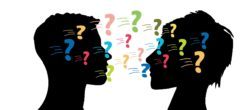 Polysemia – An abnormal awareness of possible ambiguity; the uncontrollable tendency to bring to mind an inappropriate or unintended sense of a word in any context.
Polysemia – An abnormal awareness of possible ambiguity; the uncontrollable tendency to bring to mind an inappropriate or unintended sense of a word in any context.
So polysemic words can have more than one meaning. But they can also simply have a connotation that is brought to mind when one hears the word. Words with a negative connotation are said to have “semantic taint.”
You know if you have ever been a teacher in junior high or high school that you cannot tell your students to turn to page 69. You can’t use the word balls even if you are talking about sports. There are lots of words and names like that.
gay – Now has actual two different meanings: 1) happy and joyful, 2) homosexual
queer – 1) Odd, 2) Slang for homosexual
homo as a prefix – see above
diaphragm – 1) part of the body used to breathe and sing, 2) birth control device
fairy – 1) little character with wings in fairy tales, 2) slang for homosexual man
period – 1) punctuation mark, 2) menstruation
prick – 1) to stab as with a needle, 2) slang for male body part
screw – 1) little tool for putting things together, 2) slang for sex
There are people’s names who either mean something (generally in slang) and some that simply have a negative connotation:
Jack – May bring to mind the slang jack off.
John – Also name for a bathroom or for a pimp
Jezebel – Brings to mind a loose woman, although doesn’t actually mean it
Adolph – Perfectly fine name, but may bring up negatives, as one might first think of Hitler owning that name
Dick – Also slang for male body part
Peter – Ditto
Mr. Pecker, from the National Inquirer – Ditto!
Prudence – Might being to mind the thought that the owner of this name is a prude.
There is another category of words that have perfectly fine meanings, but sound “dirty” even though they are not. If you are talking to children, you might get titters (there’s one right there) when you say these words:
hoary (not whore-y)
penal
asinine
feckless
titillate
Uranus
tit for tat
seaman (person in the Navy)
Some of this information comes from a book, Verbatim, which I recommend to word lovers. The book was taken from a journal, Verbatim, The Language Quarterly. Founded in 1974, the journal was supposed to have 4 pages per issue. It soon grew to 6 pages and then to as many as 64 pages per issue. The first 24 issues take up 991 pages of text.
Verbatim was founded by Laurence Urdang, one of the most prolific lexicographers of the English language. He was also a dictionary editor. The final editor of the now defunct journal was Erin McKean, an American lexicographer and the founder of Wordnik.com, the world’s largest online dictionary. She is also the editor of the book Verbatim.
Lexicographer: A person who compiles dictionaries.
*******************************************************************************
The Grammar Diva will be running The Best of the Grammar Diva posts during the month of October, but I promise they will be worth the read – even if you are reading them again!
By the way, To Comma or Not to Comma has won Joel Friedlander’s book cover contest for nonfiction books, August 2018. Thanks to my great cover designer, Matt Hinrichs!
September 21, 2018
New Ways with Old Words (and Punctuation) – Part 2
 Last week’s post was the first part of this two-part article. Among other things, we talked about repurposing words with new “tech” meanings and new parts of speech.
Last week’s post was the first part of this two-part article. Among other things, we talked about repurposing words with new “tech” meanings and new parts of speech.
With a new word added to the language every two hours (want a new word? wait 120 minutes!), there is always something new for word lovers to learn. Now there is actually a new word that means “word lover”: wordie, which is of course patterned after such words as foodie (food lover) and groupie (lovers of some musical group).
We all remember the coining of the term Amber Alert some years ago, an alert given out when a child is missing. Now there is the Silver Alert, which informs the public when an elderly person is missing.
It seems very current to combine two words to make a new word. We have mansplaining and hangry, but there are others:
Antifa is a combination of anti and Fascist.
If going to the Holiday Inn is your idea of camping, you are glamping, a combination of camping and glamorous. Actually, the term probably refers more to a fancy RV than to a motel!
Then, of course, there are the myriad hybrid dog breeds: schnoodle, Yorkie poo, chiweenie, labradoodle—you name it— they used to be called “mutts,” but now fetch (excuse the pun) high prices with their new, fancy names.
Remember when apple was lowercase and was just a fruit? When you type apple into your phone now, you may be autocorrected to use an uppercase A.
Punctuation is not immune to changing connotations. In 2016 grammarian David Crystal noticed a change in the period, or full stop. At a British writer’s festival, he announced that no longer was the period a simple sentence ender. Particularly in text messages, the period has become rather passive-aggressive:
Your friend texts: Let’s meet at the cafe at 3
You text back: Fine.
Would you be friendlier if you texted back simply Fine
?????
Don’t miss next week’s post: “Tainted Words”. . .
September 14, 2018
This Blog Post Is “Epic”! New Ways with Old Words
The English language is alive and well—and changing. And that is probably a good thing, as much as grammarians like me resist some of  these changes. However, this post isn’t about grammar and punctuation “rules” changing (they really don’t change that often); it is about words themselves adapting to societal changes. Think about George Orwell’s 1984: Big Brother was trying to make the language smaller because the fewer ways we have to express ourselves, the fewer feelings, thoughts, and opinions we can express. And that is a bad thing.
these changes. However, this post isn’t about grammar and punctuation “rules” changing (they really don’t change that often); it is about words themselves adapting to societal changes. Think about George Orwell’s 1984: Big Brother was trying to make the language smaller because the fewer ways we have to express ourselves, the fewer feelings, thoughts, and opinions we can express. And that is a bad thing.
Words and their uses change in many ways. Here are just a few of those ways:
Some words retain their original meanings but take on new slang meanings.
Some words take on an additional part of speech.
Some words take on new technological meanings while retaining their old meanings as well.
Some words just find new, weird ways of being used.
Words with Slang Meanings
These examples are not actually new, but are slang definitions of common words:
epic: The usual meaning is “heroic or unusually majestic,” but you might come home from a party and describe it as being “epic.”
crib: It is where a baby sleeps, but it also means “where I live,” as in “Come see my new crib; it’s epic!”
ride: It still means what you think it does, but it also refers to “my car,” and usually a nice one. “Check out my new ride.”
blast: While it still means an explosion, it also means a severely fun time. “That epic party was a blast!”
Words with New Parts of Speech
Some adjectives have been turned into nouns (mostly in advertising), and some nouns have been turned into verbs.
Use Nutella and you are “spreading the happy.” (Well, who wouldn’t agree with that one!) But what is “the happy”?
Buy makeup at Sephora and you are “celebrating your extraordinary.” Notice on this one that if you mistakenly use you’re instead of your, it all makes sense, and extraordinary is back to being a adjective!
Connect to the internet with AT&T and you are “rethinking possible.”
We used to have friends. Now we friend people, usually on social media. Many times we don’t even know these people.
A network used to be something we watched on television. Then it was something we belonged to. Now we actually have to get up and do it!
New Tech/Social Media Meanings
Many words have taken on additional meanings because of social media and technology.
Whenever someone talks about their data being stored in the cloud, I still look up at the sky and imagine a big cumulus cloud filled with “stuff.” But the cloud is just a big room filled with computers.
Bandwidth has always been a technical term, but now it applies to humans too, as “I don’t have enough bandwidth to remember all this information.”
Catfish isn’t just dinner anymore. It is making up a fake profile and pretending you are who you aren’t on social media.
I might take a swipe at you. Or I might just swipe my credit card through a machine, that is, if it doesn’t have a chip. And I don’t mean potato chip.
Remember when a troll was a little funny-looking doll with wild orange hair? Well, now you can be trolled by a troll who is posting things to you on social media to cause a reaction.
A tag gives you the price and washing instructions for your new purchase. It’s also a kids’ game. But now it is also a verb meaning to identify someone on social media.
Your car was blocking my driveway. But now I am blocking you on Facebook because I don’t like your opinions.
Footprints used to be simple, although they could be used as evidence in crimes. Now they are ecologically significant as well.
Your prominent nose used to play a big part in your profile. Now your profile tells more about you than your nose and chin.
We never used to want to catch anything viral. Now we all want to go viral.
If you get tired of all this newfangled language, all you have to do is unplug for a while. And I don’t mean the toaster.
And a Couple of Weird Things
We may have learned in elementary school not to begin a sentence with because. Of course, that isn’t even true. The teacher was just trying to prevent us from writing a sentence fragment (Because I said so.). Now, because has taken on a whole new weirdness: I am tired because homework. What???? Aren’t there some words left out there?
“It’s a thing” is now a thing. (I hear this particular “thing” comes from the television show The West Wing, which I never watched, so I don’t know.) Yup! Avocado toast is “a thing” now.
(P.S. The Oxford English Dictionary is updated quarterly, with over 1,000 words added each quarter. So if you don’t like the words, wait three months!)
Next week’s blog post will be the second part of this two-part series of weird ways with words. Check out some other posts about weird words: Wait on This I Could Care Less and Other Such Things and the Weird and Wonderful Words Series.
Grammar Diva News
Last weekend I attended and spoke at Writer’s World, a one-day conference for writers, self-publishers, editors, and everyone else who is involved in producing books. It was sponsored by BAIPA, the Bay Area Independent Publishers Association. I had to leave early to rush back to my hometown (Petaluma, CA) to attend the Local Writers Gala, a celebration of Petaluma writers. I was very impressed. Who knew there were so many successful, talented writers here? Unfortunately, the nearby fairground was hosting the Lagunitas Beer Circus. Beer or books? Which would you choose? Well, it appears that enough people chose beer to make parking impossible for the library event! Go figure!
Later this month I will again be speaking to a group of would-be entrepreneurs at the Small Business Development Center’s Next Level Class. I regularly speak at these classes at the invitation of my friend and business advisor, who teaches them. It is always fun to talk to people who are interested in starting all types of businesses — and doing my job of telling them how important writing skills are to any entrepreneur.
By the way, I plan to put out my next book some time around next June (2019). It will be a writing book, and I will be researching it and marketing my other books until then. For now, please check out the rest of my books on my book page.
September 6, 2018
My Week with Amazon
Amazon has mixed reviews. Some people just love it and have an Amazon Prime package waiting for them nearly every day. Some hate 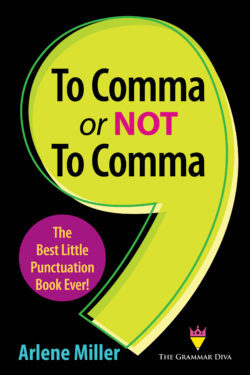 Amazon. They don’t like its politics or its treatment of its employees. I would think most authors have a love/hate relationship with Amazon. I do order many things from Amazon; it’s just so easy—and they have almost everything! And frankly speaking, I couldn’t live without Amazon. They certainly sell more books than anyone, like it or not. While I couldn’t live on what I make from my book sales on Amazon (at least right now!), I probably couldn’t live without it either. But sometimes, like in any other job, being an author/publisher is frustrating! I had a doozie last week.
Amazon. They don’t like its politics or its treatment of its employees. I would think most authors have a love/hate relationship with Amazon. I do order many things from Amazon; it’s just so easy—and they have almost everything! And frankly speaking, I couldn’t live without Amazon. They certainly sell more books than anyone, like it or not. While I couldn’t live on what I make from my book sales on Amazon (at least right now!), I probably couldn’t live without it either. But sometimes, like in any other job, being an author/publisher is frustrating! I had a doozie last week.
I assume many of my blog readers are writers and might know the procedure of getting books into the hands of the readers. Those of you will understand my tribulations of last week. For those of you unfamiliar with the process we author/publishers go through, you will get some insight.
By author/publisher, I mean an author who publishes his or her own books. Many of use the POD (print on demand) process. In other words, we don’t print 5000 books and store them in our garages. We upload our cover and inside files to whomever is going to print the books, and when someone orders a book, a copy is printed. For those of us who sell enough books, I think the printers will keep some on hand, however.
By printers I am referring to Amazon and Ingram.They are not, of course, just printers. Amazon prints and sells the books. Ingram is a very large book distributor; they take care of printing and distributing to everyone except Amazon (and sometimes Amazon too). Many authors do what I do: we take our book files, and we upload them to Amazon and to Ingram. They then magically appear on Amazon, Barnes and Noble, Books a Million, and all other online retailers—and they are also available to order from any bookstore, even if they don’t physically carry the book. Now, I am talking about print books. E-books have their own process.
The arm of Amazon that takes care of print books is called CreateSpace. And of course, the arm that takes care of ebooks is Kindle. Well, recently we found out that CreateSpace was going bye-bye, and Kindle was taking over print book production as well as e-book. My saga begins.
I was hoping to get my new book, To Comma or Not to Comma by September 8, when I had two events on the same day at which I could sell books. That NEVER happens. Two events on the same day??? The book did get finished in time, so I thought I could get print copies by that date if I hurried and paid extra for fast shipping. (Authors can buy copies of their own books at print cost plus shipping cost once the proofs are approved—either digital proofs or print proofs.
So a couple of weeks ago, I uploaded my files to CreateSpace and ordered five print proofs, paying for expedited shipping. You can order up to five print proofs, and I figured if something happened and I couldn’t get any more books in time, I could at least sell the proofs, which look exactly like final books except the last page says “Proof.” Now, I already had the e-book done and available on Kindle and all the other e-readers. This was the first time I ever did the e-book first.
I was waiting for my print proofs to arrive and called Create Space (which has excellent 24/7 customer service. Fill in your phone number and the phone rings with their call) to see if they were arriving on time. They gave me the tracking number, and I checked. They were on their way to my house. So while I am sitting at my computer waiting for them to arrive—so I can quickly approve the proofs on CreateSpace (just click the box) and order some books for my events—I see easy instructions on “migrating” from CreateSpace—because everyone needs to move their books from CreateSpace over to Kindle. I didn’t read the fine print that followed the large, easy steps. I pressed three buttons and I was migrated.
No sooner had I migrated when the proofs appeared at my doorstep. They were perfect. I went over to Kindle to see that all my titles had migrated just fine. But . . . where was the box to check my print proof approval? Oh, the fine print said don’t migrate your books if you have a book in the approval process. Oops! So I went back to CreateSpace with its 24/7 customer service to see what I should do. The screen said I had migrated and had no CreateSpace account. I couldn’t click on the Call Me button. It was after 5 p.m. by now, and Kindle customer serve was closed until 6 a.m. My books would now be held up. I was desperate and impatient. First I tried to just create the print book all over again with the same files on Kindle. No can do. Kindle wouldn’t accept the ISBN (the unique number that identifies every book) because it had been used—yes, on the print book from CreateSpace that was now in a black hole somewhere.
So being resourceful, I actually created a fake CreateSpace account with another of my e-mail addresses and my old pseudonym so that I could maybe get the customer service back. It worked! They called—and told me they couldn’t do anything and I would have to talk to Kindle.
I was on the phone with Kindle at 6 a.m. promptly the next morning, after having written probably more than one e-mail already (patience is not my virtue). They suggested I upload the files again, starting anew. I told them I had tried and they wouldn’t let me use the ISBN. Kindle customer service is very polite, but all they do is refer the issue to the technical team and tell you to wait 24 to 48 hours and they will contact you. But I was in a hurry! They told me there was no way to approve the CreateSpace book, and that there were multiple technical glitches because of the migration. What could I do?
Well, you might ask, why didn’t I just take the files and upload them to Ingram? Ingram does get them on Amazon, and I could order books from Ingram for my events. They do tend to be a little slower. And my cover designer had been on vacation and hadn’t yet gotten me the cover file for Ingram, which is slightly different from the cover file for Createspace/Kindle. I e-mailed him in a semi-panic and asked for the file ASAP. Meanwhile I talked to Kindle again and tried to upload the files. This time they had straightened out the ISBN problem, and the files were accepted. But then, they were processing for over an hour (it should take about three minutes at most), and then I got an error message that something was wrong with the interior file—which I knew wasn’t the case.
I received the cover file and went over to Ingram to upload the files. Ingram costs, whereas Kindle doesn’t. I have a perk from my publisher’s group that apparently lets you save that $75 upload fee on Ingram. I had never taken advantage of it for some reason and decided this time I would. Well, they wouldn’t accept it, so I paid. I figured I had no time for a physical proof, and I would have to approve just a digital proof and order the damn books. I uploaded and the next day got the news that the files were accepted, but there was a color issue with the cover. I could relieve them of responsibility and go ahead with the printing—or spend yet more time to get the colors fixed. I knew it was probably not going to matter, since Ingram is fussier than Amazon with print files. I told them to go ahead and print. I approved a digital proof and ordered books, paying extra for fast printing and shipping. Yay! I spent a lot of money, but I would have books in time!
Meanwhile, things got straightened out at Kindle, and I was able to upload the files, which were accepted. I approved the digital proofs, but figured I would order a print proof just in case anything was different from the perfect CreateSpace proofs I had gotten. The book went up live on Amazon. Yes!
Yesterday, a few days before the events, I received the box of books from Ingram; they are perfect, with no color issues, even though my wonderful cover designer did send new files with what they wanted (don’t need them after all). And I received the Kindle proof I ordered, which was also perfect.
Now, only one thing remains: Wouldn’t it be sad if I went through all that and I don’t sell those books!
Update: New glitch with Ingram! And I found out by mistake. Good thing. I went into my local bookstore with the book, telling them they could now order copies. They order from Ingram. The manager looked it up and saw that it was “nonreturnable.” If you want a bookstore to order your books, they must be listed as “returnable.” I KNOW I entered “returnable” on the screen as I did with every other book I have done. So after an hour with customer service (or no-service), I think I got that fixed—except they update that information only once a month, so they don’t be returnable until October 1. So basically, Ingram has cost me a month’s worth of sales because schools, bookstores, etc. won’t buy without being able to return the books. The life of an author/publisher.
NEXT WEEK: I think you will really enjoy next week’s (or in might be in two parts) blog post: New Ways with Old Words.
August 31, 2018
Seeing Red?
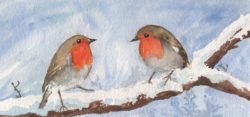 I am happy to present to you a guest post by Jags Arthurson . . .
I am happy to present to you a guest post by Jags Arthurson . . .
I love words. Not just the meaning of words but their etymology: where they came from; how they evolved; how their meanings, sounds, and rhythms have changed with changing culture and social mores. Words tell us so much about how times and thinking have evolved. For example, think of all the words earlier generations used that are no longer acceptable or “politically correct.” And swear words—the worst words we can utter—lose their impact and soften over time. “By Our Lady” (absolutely obscene in the Middle Ages) became “bloody” (still quite risqué when I was 11 and caned for using it), now so mild as to be almost acceptable in front of children.
Every concept needs words to express it and without the words simply cannot exist. The Sami people of Lapland, the so-called “Eskimos of Europe,” have nearly ninety words for snow. They need these in order to survive. We get by with snow, sleet, slush and a few others, but they need to be able to tell each other when snow is safe to walk on or if it will swallow a sled and team in an instant. Will it allow fast passage? Or cling to the runners, dragging on progress and tiring the reindeer? (Try Miss Smilla’s Feeling for Snow by Peter Høeg.)
On the other hand, giving certain meanings to words can control the way we think. There are people in Africa who physically cannot tell the difference between certain shades of blue and green … because they use just one word to describe all those colours. This idea is explored in some detail in George Orwell’s 1984 when Big Brother changes the meaning of words on an almost daily basis in order to control the thinking, and therefore behaviour, of the people.
And if you think you are immune, here is a perfect example:
In Europe we have a bird, the European Robin, Erithacus rubecula. “Robin Redbreast”—usually depicted standing on a snow-covered log—adorns Christmas cards across the globe, even in countries that have never seen a living example of the creature.
Ask anybody, from the tiniest tot to a grown adult, to draw one or colour in an outline, and the first colour they will reach for is scarlet. Everybody knows the colour.
So red are the chest feathers of this bird that there are folk stories from across Europe telling how this colour arose, mainly involving the blood of Christ during the crucifixion.
When the Victorians introduced the world’s first national postal delivery system, the delivery boys’ uniforms included a crimson waistcoat and they were immediately nicknamed “Robins.”
In Latin rubecula indicates “red.”
But there is a problem because the breast of the European Robin is not red—it’s orange! Even people who see these birds on an almost-daily basis will insist this statement is incorrect, and the breast is red. Shown a photograph as proof, they may suggest there was something wrong with the development process, or the film, or the camera … anything except that they might have been misled, or have misled themselves, all these years. Okay, have you just Googled “European Robin”? Were you surprised that I am right? Proof of the power of words.
So how did this strange situation come about?
The problem is that the bird has existed alongside man for tens of thousands of years, but the word orange didn’t enter the English language until the sixteenth century. Until then there was “red” and variations of “red.” The nearest the language had to orange was “yellow-red” (geoluread—geh-olloo-reh-ahd—in Old English). But “Robin Geoluread-Breost” doesn’t have much of a ring to it, does it?
The word orange probably originated as the name of the fruit in Sanskrit or Tamil, arriving in Europe via the Arabic naranj (they’re all very similar to modern Spanish’s naranja). When the Europeans acquired the “yellow-red” fruit, they started using the name to describe the colour.
But wait a minute. How did naranj morph into orange? By a process called “rebracketing” or “wrong word division,” and it’s easy to see how “a naranj” became “an aranj” and finally “an orange.” This process was also seen when, for example, a napron became an apron, or in reverse when an eke name (literally an “also name”) became a nickname.
But orange presented another difficulty to the English language in that it is one of the few words for which there is not a perfect rhyme. But on that score I think we might also have struggled with geoluread too.
Jags Arthurson
Jags Arthurson is the pen name of a Brighton, UK writer. Jags has been a research chemist and company director. He has lived and worked in over 40 countries. His acclaimed first novel, the crime thriller Pagan Justice, is available on Amazon with all proceeds going to charity.
*********************************************************************
Grammar Diva News
Saturday, September 8 is a big day!
Come to Writer’s World, presented by the Bay Area Independent Publishers Association! Bring a friend and one of you gets in for FREE! Many speakers, vendors and workshops for writers, editors, indie publishers, and anyone interested in the world of writing and publishing. I will be speaking at 11 a.m. about The Wonderful World of Words: What is the difference between a writer and an author? What leeway do writers have in following/breaking grammar rules? Grammar and Punctuation Q and A, and Word Trivia! Click here for details!
That same day, from 2 to 5 p.m., come on down to the Petaluma branch of the Sonoma County Library to meet (and buy books from) 30 local authors. I will be there with my books.
Finally, after much tribulation….To Comma or Not to Comma is out in print as well as e-book format. Check it out on Amazon. It will also be available for sale at both the aforementioned events!
August 23, 2018
The Grammar Diva’s Gastronomical Greasy Spoon
 If you owned a restaurant, what would you name it? Joe’s Place (substitute your own name)? Main Street Tavern? Cooked? The Grill?
If you owned a restaurant, what would you name it? Joe’s Place (substitute your own name)? Main Street Tavern? Cooked? The Grill?
I recently read that there is a trend for names of restaurants to be adverbs. I thought I would find out, so I looked up the top thirty restaurants in my city. I found no adverbs. Did you ever hear of a restaurant called Slowly? Deliciously? When? I didn’t think so.
I did find one restaurant whose name is a complete sentence—an exclamatory one, with two exclamation points—What a Chicken!! It is actually a Mexican restaurant. I have been there once, and I won’t forget it. I apparently cut my tongue with a chip and nearly bled to death. But enough about me….
No adverbs, but I did find a few restaurants whose names were adjectives, actually past participles: Twisted, Seared, and Sauced (wine, steak, and ribs in that order). Those are three separate places.
Possessives were pretty popular, understandably. Just look at the title of this post. We have Gator’s Rustic Burger and His Creole Friends, Sax’s Joint, Chili Joe’s, Alfredo’s Italian Restaurant, Sarah’s Eats and Sweets, and Brewster’s Beer Garden. Makes sense that people like to name restaurants after themselves or their kids— or someone imaginary.
Some restaurants are named for their location: The River Front Cafe, The Water Street Bistro, Central Market (not actually on Central, but in the center of downtown), 256 North, and Fourth and Sea, which is also a play on words. It’s a fish and chips place at Fourth Street and C.
Many restaurants are solitary nouns:
Pearl—Someone’s name perhaps?
Wishbone
Crocodile (I think it’s French…)
Stockhome–Another play on words. Scandinavian food (or the home of soup?)
Some owners name their restaurants by defining what they offer you: The Speakeasy, The Shuckery, Pub Republic, and Brasil BBQ. You pretty much know what you are going to get there.
So what is left? Verbs? No, I didn’t see any verbs. But I saw a couple of names that didn’t fit into any category.
Cafe Zazzle. What is a zazzle? Maybe a cross between dazzle and zing???It says it is a cafe, but it really isn’t. It has a fusion menu. Kind of vegetarian, kind of Asian. Catchy, nonetheless. Wouldn’t’ you want to check it out?
The Drawing Board. Beats me.
So now, what is with the goats? I have heard of goat yoga. But in my general vicinity we have the Wild Goat Bistro, Flying Goat Coffee, and Crooked Goat Brewing. Are goats wild? flying? or crooked?
_________________________________________________________
Grammar Diva News
Come to Writer’s World, sponsored by the Bay Area Independent Publishers Association! I will speaking about the Wonderful World of Words at 11 a.m. The event is on Saturday, September 8, at Dominican University in San Rafael, CA. Click here for more info.
On the same day as Writer’s World—in the afternoon from 2-5—come celebrate Petaluma authors at the Petaluma branch of the Sonoma County Library! Click here for more info.
I am waiting for the proofs from Amazon for To Comma or Not to Comma. Will be available in paperback in a week or less on Amazon. It will be available in a couple of weeks on all other online bookstores and to order from any bookstore.
August 16, 2018
Hand Out This Handout: Phrasal Verbs
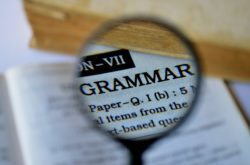 We know what a verb is. And we know that a phrase is a group of words, usually a small group. So a phrasal verb is a verb that is more than one word. Usually it is a verb followed by a preposition: hand out. Well, that isn’t quite right because hand is a noun. But when paired with out, it becomes a verb. You can also pair hand with in, off, over, and to and voila! You have a verb. Most phrasal verbs, however, are verbs paired with prepositions — or what seem to be prepositions. Actually, they are often referred to as adverbs, not prepositions.
We know what a verb is. And we know that a phrase is a group of words, usually a small group. So a phrasal verb is a verb that is more than one word. Usually it is a verb followed by a preposition: hand out. Well, that isn’t quite right because hand is a noun. But when paired with out, it becomes a verb. You can also pair hand with in, off, over, and to and voila! You have a verb. Most phrasal verbs, however, are verbs paired with prepositions — or what seem to be prepositions. Actually, they are often referred to as adverbs, not prepositions.
A preposition is generally thought to be part of a prepositional phrase: preposition+article (usually)+noun or pronoun:
in the doghouse
above the clouds
under the table
to the mall
between the houses
outside the lines
When you put what looks like a preposition after a verb, it becomes an adverb: She walked outside. Please come in.
In any case, a verb that contains more than one word is a phrasal verb. And many phrasal verbs are also nouns. However, when you make a phrasal verb into a noun, it usually becomes one word, and that is where many people mess up. I see phrasal verbs written as one word, when they should be two. It is the noun that is one word. It is not as common that I will see the noun written as two words. Here are some examples of phrasal verbs and the nouns they become:
I need to set up the exhibit. I don’t like the setup of the room.
I need to back up my computer. I need to perform a backup on my computer.
Please take out the trash. Let’s get takeout for dinner.
We will blow up these balloons. My boss and I had a huge blowup.
Tomorrow we will break down the exhibit. She had a nervous breakdown. (Is that even a thing anymore?)
Break up the peanut brittle into pieces for everyone. She and her boyfriend just had a breakup.
I am going to break out my dancing shoes. My skin is having another of its breakouts.
The candle will burn out shortly. I have burnout from my stressful job.
Hand out these papers to the class. Did you get the handout to help you study for the quiz?
We will kick off Back to School Week tomorrow. Can you come to the kickoff on Saturday?
It is time to let down your defenses. When vacation ends, it is a real letdown.
I need to make up my test today. You are wearing too much makeup.
Did you pay back your loan yet. This is payback for how you treated me!
You need to show off that new ring! You are such a showoff!
I work out for an hour every day. I am really tired from my workout.
Did you mix up the days for the parties? It was just an innocent mixup.
One way to remember that the verb is two words and the noun one is simply by the old pause trick. We usually pause when saying the phrasal verb, but not when saying the noun.
GRAMMAR DIVA NEWS
Calling all writers, would-be writers, editors, marketers, designers, and anyone interested in writing or publishing!
Saturday, September 8 is Writer’s World at Dominican University in San Rafael, California. This event is sponsored by the Bay Area Independent Publishers Association. All day— with vendors, speakers, workshops, music, books! I will be speaking at 11 a.m. about The Wonderful World of Words: What is the difference between a writer and an author? What leeway do writers have with grammar rules? Grammar and punctuation Q and A, and Fabulous Word Trivia! Click here for more info!
Also on Saturday, September 8 is the Local Author Gala at the Petaluma branch of the Sonoma County Library. This event is free and goes from 2 to 5 p.m. I will be there too selling my books, and meeting and greeting!
To Comma or Not to Comma is now available on all e-readers including Kindle, Nook, Kobo, iBooks, Overdrive, etc. I have just sent the index for the printed book to the designer. The cover designer has the back covers. So, printed book very soon!
August 9, 2018
One Word — Or Two?
Words like anyway (any way), everyday (every day), and others can either be one word of two depending on how they are used. Many times I see these words  written as one word when they should be two. So what is the difference, and how do you know?
written as one word when they should be two. So what is the difference, and how do you know?
awhile/a while – This one is tricky. If you put a preposition before it, use two words: a while, which is a noun. Awhile is an adverb.
I can stay for only a while. He will be here in a while.
Come sit here awhile.
anyway/ any way – With many of these words, you can tell which one to use by seeing if you would pause between the parts of the word. Any way is an adjective and a noun. Anyway is an adverb.
I can go anyway. Who cares, anyway?
Is there any way you can take my place at the meeting? I will get there any way I can.
sometime/some time/sometimes – Some time is a noun and an adjective. Sometime and sometimes are adverbs.
I hope you have some time to help me with this.
Please come visit sometime.
Sometimes I go to the beach on weekends.
any time/ anytime – Any time is a noun and an adjective. Anytime is an adverb.
I don’t think I have any time to do laundry today.
Come visit anytime. You can get these chores done anytime.
every one/everyone – Everyone is an indefinite pronoun. Every one is a pronoun and an adjective.
Every one of you should be studying your math. I frosted every one of these cupcakes.
Everyone is taking the bus to the fair. Hello, everyone!
any one/anyone – Any one is a pronoun and an adjective. Anyone is an indefinite pronoun.
Did any one of you see the cat? Any one of you can try to fix the printer.
Is anyone there? I didn’t see anyone come in.
some thing/something/some things – Some thing and some things are nouns and adjectives. Something is an indefinite pronoun. Actually some thing and something are the same, so use something. Because some implies more than one, we wouldn’t use some thing (but we would use some things) .
Something is in my eye. I heard something about you from my brother. (Some thing would mean the same thing, so we just use something.)
Some things are bothering me about this plan. I have some things for you to buy.
everyday/every day – Every day is a noun and an adjective. Everyday is an adjective.
I swim every day at 6 p.m. Every day is a fresh start.
My swimming program is an everyday thing.
GRAMMAR DIVA NEWS
WRITERS WORLD
All writers and those interesting in writing, editing, publishing, design, marketing of books. The Bay Area Independent Publishers Association (BAIPA) invites you to Writers World on Saturday, September 8 at Dominican College in San Rafael, Calfornia. There will be vendors, a Q&A session, and many speakers (of which I will be one). For more information, go to the BAIPA website.
Sign up today by midnight for early bird prices.
Me at the Sonoma County Fair selling my books. A fun time! .
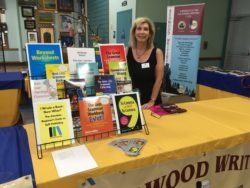
Now on Kindle! On all other e-readers this week. In print later this month.

August 3, 2018
Lyrical Malapropisms
The noun malapropism, first recorded between 1840 and 1850, is defined as “an act or habit of misusing words ridiculously, especially by the confusion of words that are similar in sound.”
A malapropism probably develops because we hear the words a certain way, and while what we hear is close to what is being said, it isn’t quite right. For example, a chest of drawers is a piece of furniture. However, it is often pronounced as chester drawers because that is the way it rolls off the tongue. Sometimes, perhaps a malapropism is created because the “correct” phrase actually makes less sense to someone than the phrase they hear: butt naked instead of buck naked, or nipped in the butt instead of nipped in the bud.
Well, I have a whole book containing commonly confused words and malapropisms, and this post isn’t about those. This post is about the malapropisms that arise in popular songs. You have probably heard someone singing at the top of his or her lungs—the wrong words to a song that make absolutely no sense and are ridiculous, yet actually do sound like what the performer is saying.
With some songs, it is a miracle anyone can understand any of the words. Perhaps you are old enough to remember “Louie Louie” by the Kingsmen from the 1960s. Rumors were rampant about how the lyrics were “dirty,” yet no one really knew what they were. People would play the 45 (I am dating myself here) at 33 speed to try to figure out the words. I happened to see the Kingsmen in person in my hometown of Lynn, Massachusetts—at City Hall, no less. They played “Louie Louie” three times—I will never forget it— but I still couldn’t figure out any of the words. Of course, now with the internet, you can look up the lyrics to any song. I have looked up the words to “Louie Louie,” and although I don’t remember what they were, what was on the internet wasn’t “dirty” at all.
Here are some humorous “lyrical malapropisms” you might know . . .
Jimi Hendrix’s “Purple Haze”: Excuse me while I kiss this guy. Nope. It’s Excuse me while I kiss the sky.
Elton John’s “Tiny Dancer”: Hold me closer, Tony Danza. Nope. It’s Hold me closer, tiny dancer.
Johnny Rivers’ “Secret Agent Man”: Secret Asian man. Nope. It’s Secret agent man.
Creedence Clearwater Revival’s “Bad Moon Rising”: There’s a bathroom on the right. Nope. It’s There’s a bad moon on the rise.
Bob Dylan’s “Blowin’ in the Wind”: The ants are my friends, they’re blowin’ in the wind. Nope. It’s The answer, my friends, is blowin’ in the wind.
Johnny Nash’s “I Can See Clearly Now”: I can see clearly now Lorraine is gone. Nope. It’s I can see clearly now the rain is gone.
Starship’s “We Built This City”: We built this city from sausage rolls. Nope. It’s We built this city from rock ‘n’ roll.
ABBA’s “Dancing Queen”: See that girl, watch her scream, kicking the dancing queen. Nope. It’s See that girl, watch that scene, dig in the dancing queen.
Sir Mix-A-Lot’s “Baby Got Back”: I like big butts in a can of limes. Nope. It’s I like big butts and I cannot lie.
The Fifth Dimension’s “Aquarius”: This is the dawning of the Age of Asparagus. Nope. It’s This is the dawning of the Age of Aquarius
Yup. It’s pretty funny until you’re the one merrily singing the wrong words at karaoke.
Oh, by the way, websites disagree (of course) on the “Louie Louie” lyrics, but I just looked it up again. This version does have one four-letter word, but they could have been saying anything there. Click here to check it out.
________________________________________________________________________
It’s here! Available on Kindle Monday, August 6. Available on other e-readers later this week and in print later this month.
Comma confusion?
Ellipsis enigma?
Apostrophe apoplexy?
Dash dilemma?
Don’t worry. Help is on the way!

